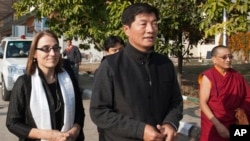The United States and India face a common challenge: overcoming the threat of terrorism.
The rise of groups like ISIL underscores the limits of conventional approaches. “We need a broader bolder, and smarter approach to turn back terrorism,” said Under Secretary for Civilian Security, Democracy, and Human Rights Sarah Sewall, “one that goes beyond countering terrorists with our military, intelligence, and law enforcement tools to also preventing people from becoming terrorists in the first place.”
The best way to do that is through a comprehensive approach that calls for partnerships at every level between government and civil society. Public officials play a role by governing effectively and upholding the rule of law. At the same time, religious, business, and academic leaders need to challenge violent extremism and promote messages of peace.
Religious leaders are among the most critical actors in pushing back against violent extremism, said Under Secretary Sewall. They can teach curious young minds tenets of faith and refute extremist interpretations that exalt violence.
Across India, from Kerala to Kashmir, faith communities are mobilizing to challenge violent extremism. One-and-a-half million Muslims from the region gathered in Uttar Pradesh last month to reject global terrorism and affirm the Qu’ran’s injunction that “killing one innocent person is equivalent to killing all humanity.”
More than 70,000 clerics from around the world gathered in Bareilly to condemn ISIL as “inhuman and un-Islamic.” And in Delhi, students at a local college lit candles to outshine ISIL’s darkness as Muslim women raised their voices to decry ISIL for “carrying out such inhuman acts in the name of Allah.”
Governments can help by ending stifling regulations on civil society and allowing citizen groups to peacefully speak and organize around sensitive topics. They can go a step further by proactively reaching out to build ties with communities targeted by violent extremists for recruitment, like in Maharashthra, where local police are partnering with local clerics to de-radicalize youth.
As detailed in the U.S.-India Joint Declaration on Combatting Terrorism, the U.S. stands shoulder-to-shoulder with India against this common threat, from expanding intelligence sharing, to cracking down on illicit terrorist financing, better securing our borders, ports, and public transportation, and helping to train thousands of Indian security personnel.
The United States and India are committed to pursuing a comprehensive approach to countering violent extremism by empowering local communities, embracing diversity, and staying true to shared common values.




